|
|
|
Sort Order |
|
|
|
Items / Page
|
|
|
|
|
|
|
| Srl | Item |
| 1 |
ID:
131389
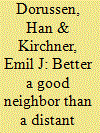

|
|
|
|
|
| Publication |
2014.
|
| Summary/Abstract |
Under what conditions do regional security organizations (RSOs) take up a broader agenda or scope in security governance? Further, does broader scope matter for regional security? These questions are addressed using a quantitative comparative analysis of 25 RSOs over the period 1990-2009. Similarity among members in their capacities and political systems are identified as two central conditions for increased scope. In contrast, hegemony is not a significant factor. Institutionalization also seems to matter: RSOs that have been around longer and encompass more members are more successful in expanding their security agenda. There is only weak empirical support for the idea that RSOs with a broader scope have a stronger pacifying effect on regional security. The implications of these findings are discussed in greater detail for Asian RSOs, which have only limited scope and operate in comparatively high levels of insecurity. However, except from the legacy of conflict, variables identified in the general models apply similarly to Asia.
|
|
|
|
|
|
|
|
|
|
|
|
|
|
|
|
| 2 |
ID:
137418
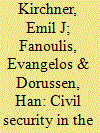

|
|
|
|
|
| Summary/Abstract |
Noting that European Union (EU) institutions are increasingly engaged in civil protection in the member states, security governance is used as an analytical framework to assess the depth of EU engagement in delivering civil security. It is shown that a state-centric approach is no longer adequate to understand the provision of civil security across Europe. To varying degrees, the EU has acquired responsibilities to facilitate, coordinate, manage, and regulate civil security, whether before or after a civil crisis occurs. The analysis demonstrates that, whilst intergovernmental practices and inter-state cooperation remain salient features of civil security, the responsibilities undertaken by the EU institutions across the entire policy spectrum are more substantial than a strictly intergovernmental perspective would suggest.
|
|
|
|
|
|
|
|
|
|
|
|
|
|
|
|
| 3 |
ID:
184197
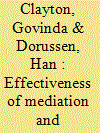

|
|
|
|
|
| Summary/Abstract |
Mediation and peacekeeping are commonly used tools to manage conflict. To what extent are they complementary and effective instruments for ending violent conflicts? Generally, they are seen as distinct tools: mediation aims to facilitate negotiated settlements, while the goal of peacekeeping is to prevent agreements from collapsing. However, peacekeeping and mediation regularly occur simultaneously. Arguably, peacekeeping operations rely on continuing political processes, while peacekeepers create a context favorable for mediation and provide a valuable source of independent information. Using a variety of model specifications, including selection models, empirical evidence supports that (a) mediation rather than peacekeeping is key to halting hostilities, (b) mediation and peacekeeping are largely complementary, but (c) this complementarity is conditional: in the post-Cold War period, transformative peacekeeping boosted the effectiveness of mediation to halt civil wars. There is no evidence that peacekeeping on its own matters for ending conflict. Finally, counterfactual analysis shows the substantial impact of mediation and peacekeeping on the frequency of conflict.
|
|
|
|
|
|
|
|
|
|
|
|
|
|
|
|
| 4 |
ID:
019956


|
|
|
|
|
| Publication |
Aug 2001.
|
| Description |
395-426
|
|
|
|
|
|
|
|
|
|
|
|
|
|
|
|
| 5 |
ID:
120132
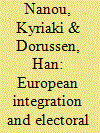

|
|
|
|
|
| Publication |
2013.
|
| Summary/Abstract |
The assignment of policy competencies to the European Union has reduced the divergence of party policy positions nationally, leaving the electorate with fewer policy options. Building upon insights from spatial proximity theories of party competition, the convergence argument predicts convergence particularly in policy domains with increasing EU competence. As the policy commitments that derive from EU membership increase, parties become more constrained in terms of the feasible policy alternative they can implement when in office. The analysis uses manifesto data at the country-party system level for nine policy domains. It uses ordinary least squares (OLS) estimation with country fixed effects, a lagged dependent variable and country corrected standard errors. Controlling for other factors that could plausibly explain policy convergence, the models also assess whether the convergent effect of party positions varies across different types of parties. The main finding is that in policy domains where the involvement of the EU has increased, the distance between parties' positions tends to decrease. The constraining impact of EU policy decisions differs between Member and non-Member States. This effect is more apparent for the policy agendas of larger, mainstream and pro-EU parties in the Member States.
|
|
|
|
|
|
|
|
|
|
|
|
|
|
|
|
| 6 |
ID:
106335
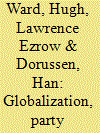

|
|
|
|
|
| Publication |
2011.
|
| Summary/Abstract |
The authors argue that the effects of economic globalization on social democratic parties in Western Europe are conditional on the position of the median voter. If the median is far enough to the right, such parties will adopt business-friendly policies because they are required to win office. Only when the median is relatively far to the left will globalization constrain social democratic parties, forcing them to adopt policies further to the right in order to retain credibility. It is on this basis the authors argue that empirical studies are misspecified unless they include an interaction between measures of globalization and the position of the median. In addition to presenting formal theoretical arguments, the article reports empirical findings from fifteen countries in the period from 1973 to 2002 that support the conclusion that the effects of globalization are indeed contingent on the median. The authors find that the effects of globalization are significant for social democratic parties only in circumstances in which the median is relatively far to the left.
|
|
|
|
|
|
|
|
|
|
|
|
|
|
|
|
| 7 |
ID:
068734


|
|
|
| 8 |
ID:
080976
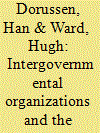

|
|
|
|
|
| Publication |
2008.
|
| Summary/Abstract |
The authors use network analysis to argue that the main contribution of intergovernmental organizations (IGOs) to international stability is not necessarily their direct and individual impact, because generally IGOs are institutionally weak. Rather, membership of IGOs creates network ties between states, allowing them, either individually or collectively, to intervene more effectively in latent conflicts. The IGO network also provides direct and indirect communication channels, where indirect links can act as partial substitutes for direct diplomatic ties. Empirically, the authors apply these ideas to the extensive network of international linkages created in the post-World War II period. They demonstrate that indirect links do indeed matter and that they substitute for more direct diplomatic ties. Furthermore, these effects are not limited to ties created by IGOs with specific security functions
|
|
|
|
|
|
|
|
|
|
|
|
|
|
|
|
| 9 |
ID:
119956
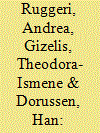

|
|
|
|
|
| Publication |
2013.
|
| Summary/Abstract |
How many peacekeepers are needed to keep the peace? Under what conditions are local governments and rebel forces more willing to cooperate with an intervention force? From a theoretical perspective in which the main role of peacekeepers is to assist local actors in overcoming their commitment problems and mistrust toward each other, it follows that sufficiently robust missions should positively affect levels of cooperation. Furthermore, any effect should be conditional on the local balance of power, that is, the military leverage between government and rebel forces. Relatively weak rebel groups-facing a stronger government-should be more willing to cooperate with larger missions. In the empirical analysis, using newly collected event data on United Nation (UN) peacekeeping operations from 1989 to 2005 in African civil wars, the authors find support for conditional effect of robust peacekeeping: there is more cooperation with UN peacekeepers when the rebels are weak.
|
|
|
|
|
|
|
|
|
|
|
|
|
|
|
|
| 10 |
ID:
145690
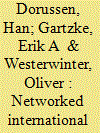

|
|
|
|
|
| Summary/Abstract |
Network theory and methods are becoming increasingly used to study the causes and consequences of conflict. Network analysis allows researchers to develop a better understanding of the causal dynamics and structural geometry of the complex web of interdependencies at work in the onset, incidence, and diffusion of conflict and peace. This issue features new theoretical and empirical research demonstrating how properly accounting for networked interdependencies has profound implications for our understanding of the processes thought to be responsible for the conflict behavior of state and non-state actors. The contributors examine the variation in networks of states and transnational actors to explain outcomes related to international conflict and peace. They highlight how networked interdependencies affect conflict and cooperation in a broad range of areas at the center of international relations scholarship. It is helpful to distinguish between three uses of networks, namely: (1) as theoretical tools, (2) as measurement tools, and (3) as inferential tools. The introduction discusses each of these uses and shows how the contributions rely on one or several of them. Next, Monte Carlo simulations are used to illustrate one of the strengths of network analysis, namely that it helps researchers avoid biased inferences when the data generating process underlying the observed data contains extradyadic interdependencies.
|
|
|
|
|
|
|
|
|
|
|
|
|
|
|
|
| 11 |
ID:
145697


|
|
|
|
|
| Summary/Abstract |
Why do countries contribute troops to UN peacekeeping? Recognizing the incentives to free ride on the contributions of other countries, existing explanations have tended to focus on the private benefits of providing troops. There has been particular emphasis on some major contributing countries that gain financially from providing peacekeepers. An alternative explanation could be that countries prefer to deploy troops to peacekeeping alongside countries with similar foreign policy preferences in order to maximize jointly produced private benefits. Accordingly, the willingness to provide peacekeepers should depend on which other countries are providing troops to peacekeeping operations. The implications are explored within the context of games on networks, and it is demonstrated that in equilibrium countries that are more Bonacich central in the network of foreign policy preference contribute disproportionally to UN peacekeeping. Based on actual contributions to UN peacekeeping from 1990 until 2011, we find that policy complementarities explain why countries provide a larger proportion of peacekeepers to a particular mission. Importantly, centrality in the network of policy complementarities matters and not simply that countries have moderate policy preferences. There is robust evidence for the prevalence of peacekeeping alongside your ‘friends’; in effect, countries with a lot of ‘friends’ contribute more peacekeepers.
|
|
|
|
|
|
|
|
|
|
|
|
|
|
|
|
| 12 |
ID:
093601


|
|
|
|
|
| Publication |
2010.
|
| Summary/Abstract |
Classical-liberal arguments about the pacifying effects of international trade are revisited, and it is argued that they consistently refer to the ability of trade to provide 'connections' between people and to create a perceived 'global community'. Dependency and openness are commonly used to test for any pacifying effects of trade in the current literature, but these measures fail to capture some of the classical liberals' key insights. Several network measures are introduced in order to give natural expression to and to develop the classical-liberal view that trade linkages reduce interstate conflict. These measures applied to trade flows are incorporated in the Russett & Oneal triangulating-peace model. The main results are that trade networks are indeed pacifying in that both direct and indirect trade linkages matter, and as the global trade network has become more dense over time, the importance of indirect links by way of specific third countries has declined, and the general embeddedness of state dyads in the trade network has become more relevant. These findings suggest that the period since World War II has seen progressive realization of the classical-liberal ideal of a security community of trading states.
|
|
|
|
|
|
|
|
|
|
|
|
|
|
|
|
| 13 |
ID:
152331
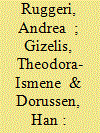

|
|
|
|
|
| Summary/Abstract |
It remains contested whether peacekeeping works. The impact of peacekeepers’ actions at the local subnational level for overall mission success has lately received critical attention. Local peacekeeping is expected to matter because it reassures local actors, deters resumption of armed hostilities, coerces parties to halt fighting, and makes commitment to agreements credible. Thus peacekeepers affect the relations between central and local elites and avoid the emergence of local power vacuums and areas of lawlessness. This study uses new subnational data on the deployment of United Nations peacekeepers. It uses matching and recursive bivariate probit models with exogenous variables for temporal and spatial variation to deal with possible nonrandom assignment of the treatment. We demonstrate that conflict episodes last for shorter periods when peacekeepers are deployed to conflict-prone locations inside a country, even with comparatively modest deployment. The effect of peacekeeping on the onset of local conflict is, however, less clear cut.
|
|
|
|
|
|
|
|
|
|
|
|
|
|
|
|
|
|
|
|
|